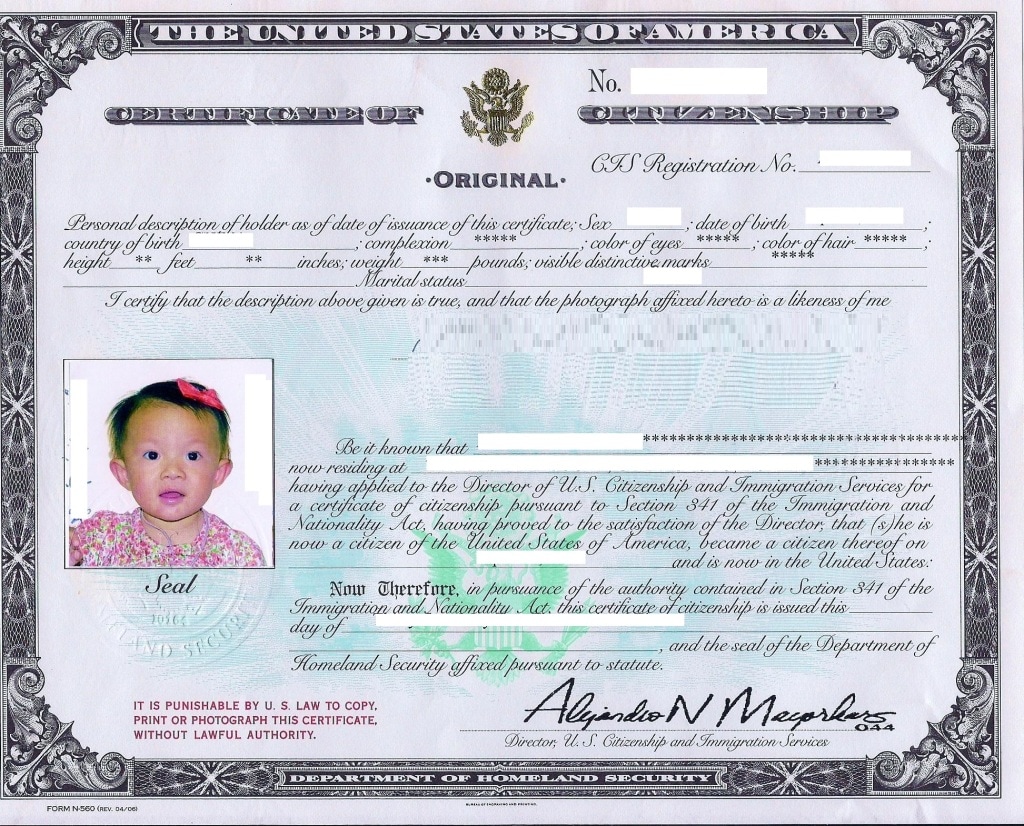 Sample Certificate of Citizenship
Sample Certificate of Citizenship There is a big difference between Certificate of Citizenship and Certificate of Naturalization. Both of them serve as evidence of U.S. citizenship status. However, unlike Certificate of Naturalization, Certificate of Citizenship does not confer United States citizenship but merely provides evidence that the applicant previously obtained citizenship status (derived through a parent).
When a person has a Certificate of Naturalization, it means that they applied for U.S. citizenship, passed the test and all background clearances, and their application was approved, and U.S. citizenship was granted.
When a person has a Certificate of Citizenship, it means that they applied for a document as evidence of their U.S. citizen status. When USCIS approves the application for Certificate of Citizenship, the USCIS merely verifies the records and issues a document, as a proof of the U.S. citizenship status. The applicant doesn't apply for citizenship and doesn't take the test. The applicant applies for a proof or evidence of his or her citizenship.
On June 2nd 2017, the BIA held that institution of judicial proceedings to revoke naturalization are not required to cancel a certificate of citizenship, which the Department of Homeland Security can cancel administratively upon a determination that an applicant is not entitled to the claimed citizenship status.
BIA held: "A certificate of citizenship only provides documentation of United States citizenship for persons who claim to have obtained that status derivatively. See 8 C.F.R. §§ 341.1, 341.2(c) (2016). It does not confer United States citizenship but only furnishes recognition and evidence that the applicant has previously obtained such status derivatively, that is, upon the naturalization of a parent or parents. See Section 341(a) of the Act. Thus, the issuance of a certificate of citizenship, like a United States passport, only serves as indicia of citizenship. It is not a grant of United States citizenship. Because the respondent’s United States citizenship claim was based on fraud, his Certificate of Citizenship is void."
Facts: The respondent is a native and citizen of Nigeria who was born in Benin City, Nigeria, on June 30, 1981. He obtained lawful permanent resident status in 1996 as the stepchild of a United States citizen who was married to the respondent’s alleged adoptive father. The respondent’s claim to United States citizenship derives from the naturalization of his putative custodial adoptive father in 1995. On February 17, 1998, the respondent was issued a Certificate of Citizenship (Form N-560).
In removal proceedings, evidence of foreign birth gives rise to a rebuttable presumption of alienage, shifting the burden to the respondent to come forward with evidence to substantiate his citizenship claim. Matter of Rodriguez-Tejedor, 23 I&N Dec. 153, 164 (BIA 2001) (citing Matter of Leyva, 16 I&N Dec. 118, 119 (BIA 1977)); Matter of Tijerina-Villarreal, 13 I&N Dec. 327, 330 (BIA 1969).
Assessing the respondent’s claim to citizenship, the Immigration Judge noted that the evidence of record raises serious questions whether the respondent has ever qualified as a United States citizen. Specifically, the record includes an August 20, 2002, notice of intent to cancel the respondent’s Certificate of Citizenship (“NOIC”) issued by the former Immigration and Naturalization Service (“INS”), alleging that the certificate had been obtained by fraud.
The NOIC was based on information obtained in connection with a Federal criminal investigation. This investigation revealed that the respondent’s putative adoptive father was actually his biological brother. Although the respondent claimed that his biological father had died in 1983, records indicated that, as of 2002, he was alive and living in Nigeria. The NOIC further alleged that the respondent submitted a fraudulent adoption certificate. In his October 23, 2002, response to the NOIC, the respondent presented a letter from an attorney specifically denying each of the allegations in the NOIC. He also submitted a purported death certificate for the person the respondent alleged was his biological father. The death certificate was issued more than 8 months after this individual’s death and just days before the respondent’s response to the NOIC was due.
In a decision dated April 21, 2003, the District Director concluded that the evidence the respondent provided in response to the NOIC was insufficient to overcome the evidence supporting the cancellation of the Certificate of Citizenship. He determined that the Nigerian adoption decree submitted on the respondent’s behalf was fraudulent and that he did not derive United States citizenship through his biological brother under former section 321(a)(2) of the Immigration and Nationality Act, 8 U.S.C. § 1432(a)(2) (1996), which was in effect when the respondent turned 18 years old. The District Director therefore cancelled the respondent’s Certificate of Citizenship after concluding that it had been obtained by fraud. On March 29, 2004, the Administrative Appeals Office (“AAO”) dismissed the respondent’s appeal from the District Director’s decision
The respondent does not claim United States citizenship through naturalization. Instead, he was issued his Certificate of Citizenship under section 341 of the Act, 8 U.S.C. § 1452 (1996), based on his claim of derivative citizenship through the naturalization of his brother, who the respondent fraudulently claimed was his adoptive father.
To read the decision, click here.

 RSS Feed
RSS Feed